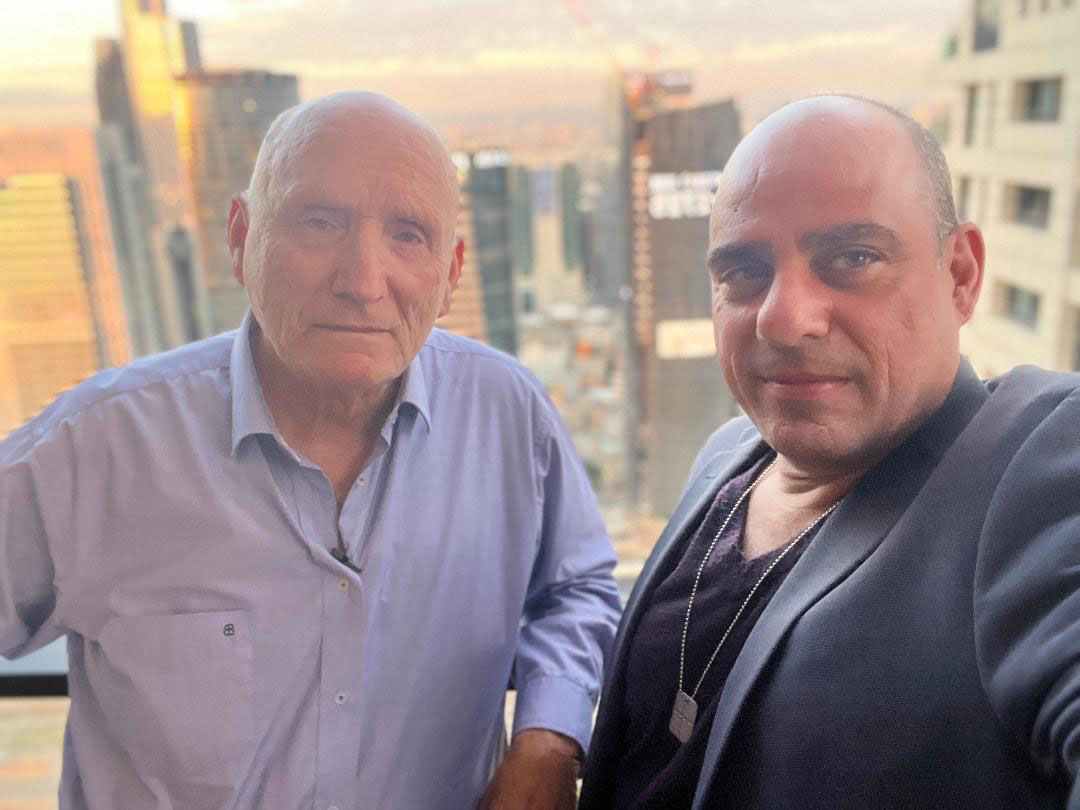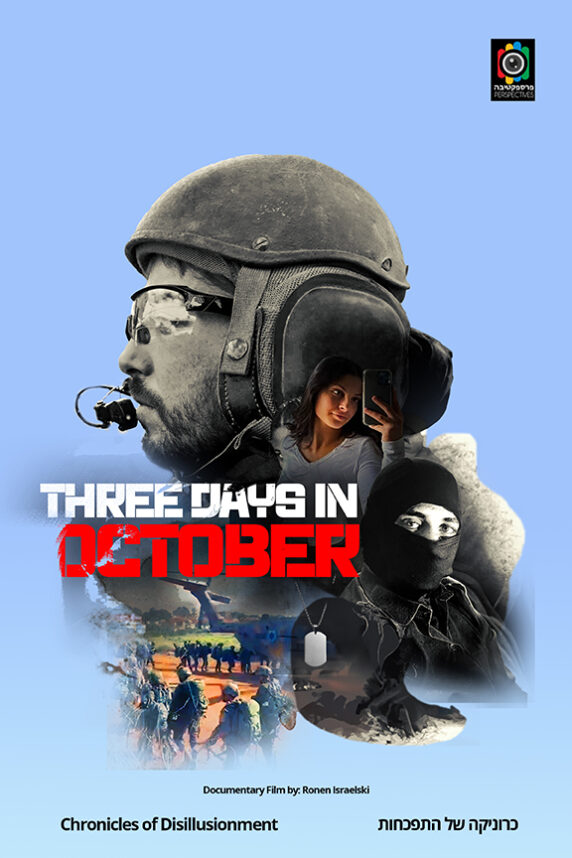 Ronen Israelski and Itzhak Brik
Ronen Israelski and Itzhak Brik - An IDF commander says he shot down two drones and 41 of his soldiers were killed.
- A mother receives a text from her daughter: “Pray for me.”
- A soldier who has battled Hamas hears that two vans of the terrorists are a mile-and-a half away, and later finds out his friend and fellow solider knelt on a grenade thrown into his tank to save others.
- “Those scum did things to us they haven’t done since the Holocaust,” a prominent leader says regarding Hamas.
These are some of the chilling moments in a powerful documentary by Israeli Canadian director Ronen Israelski, “3 Days on October,” that chronicles Oct. 6,7, and 8 and includes previously unseen footage. It will first screen at the Leah Poslun Theater at the Prosserman Jewish Community Centre in Toronto next month; after that, Israelski will screen the film at JCC’s across North America.
Israelski, a journalist and producer of the TV show “Perspectives,” explained why he felt he needed to make the documentary and why he hustled to make it quickly.
 “It will take a long time before this crisis will be over,” he told the Journal. “That’s how I see it. I hope I am wrong. The war unfortunately is still going on, the Israeli government brought back half the hostages but the rest are not back home. People are in the state of mind that this is the new war of independence. The threats are enormous. Jews outside of Israel may find it hard to understand this so that is why I made this film.”
“It will take a long time before this crisis will be over,” he told the Journal. “That’s how I see it. I hope I am wrong. The war unfortunately is still going on, the Israeli government brought back half the hostages but the rest are not back home. People are in the state of mind that this is the new war of independence. The threats are enormous. Jews outside of Israel may find it hard to understand this so that is why I made this film.”
The son of a Holocaust survivor, Israelski’s documentary “The Day I Met Hitler” looked back at the time his father came face to face with Hitler and the director’s journey to find people who were still alive and spent time with one of the most evil men in history; before they would consent to appear on camera, he had to convince them he was not a Nazi-hunter. It won the Best Canadian documentary and audience award and the Ontario International Film Festival.
“3 Days in October” includes interviews with different people affected by Oct. 7; the most powerful is Orly Gilboa. She tells Israelski her children showed a video from social media where she saw her daughter Daniela’s ponytail and realized she was a Hamas hostage. Daniela was taken from Nahal Oz. It’s wrenching to see Gilboa cry as she hopes for her daughter’s return. She expresses confusion as a mother advocating for her daughter who felt she had to speak up so her daughter would not be forgotten.
“That was the toughest moment,” Israelski said of the interview. “There is terrible news of how women are being treated there. I hope she will return home safely as soon as possible.”
The film shows video of an IDF solider in the Golani Brigade talk about Matan Abergil, his friend and fellow soldier, who died sacrificing himself on a grenade so others would live.
“Matan is a hero,” Israelski said. “This was his first operational mission and he found himself in an impossible situation. When a grenade is thrown, you have three seconds. It was thrown into the tank. By the time he grabbed it there was one second. The only thing he could do was put it close to his chest and kneel down. In his last words, he said, ‘I did it for my country. I did it for my friends.’ And then he passed away.” Yoni, a Golani Brigade commander talks about how 41 of his men died on October 7.
Former Mossad agent Avner Avraham says Israel will seek to kill all who took part in the Oct 7 attack even if it takes 20 years.
Yoav Admati, who survived the attack on Kibbutz Be’eri remembers being scared to death during the attack; he felt like he couldn’t do anything. He sadly says his neighbor Narkis Hand was one of 97 members of the kibbutz who were murdered.
There are clips from the attack at the Nova Festival. Special tour guide and first responder Ravit Naor explains that many of the 4,000 fleeing the festival site wound up in a traffic jam and were forced to run for their lives while shooting was all around them. Naor says that Hamas not only raped but also shot women and men in their genitals. Three-hundred-sixty-four attendees of the festival were murdered.
Prior to Oct. 7, Major General (Res.) Itzhak Brik predicted that Hamas could have a mission “to enter a number of towns on foot. The likelihood it will happen is very high, whether they come in the thousands or the hundreds.” He said the army would not be there to defend the citizens. He has been referred by many in the media as the man who predicted October 7.
“I wish I wasn’t right,” Brik says in the film, adding “how come they didn’t listen?”
The intensity in Brik’s eyes shows he means what he says.
Brik, who served in The Yom Kippur War, and the First Lebanon War, says that he personally warned Prime Minister Netanyahu to delay the invasion into Gaza for about two weeks for better training and more equipment; some have told him he saved lives by convincing Netanyahu to delay the attack.
While the Hamas attack on Oct.7 was the greatest humiliation in Israel’s history, he says it was a “great miracle” that Hezbollah did not attack at the same time.
Avraham Infeld, president emeritus of Hillel International was in synagogue on Oct. 7 and later in the day worried: “Is This The End?”
The most heated moment in the documentary comes when Israelski interviews Eliyahu Yossian, described as an Islam and Iran specialist. He has been criticized for making wild comments with opinions not shared by the IDF.
Yossian insists that unity is not required for Israel to win.
Israeli Intelligence and much of the world underestimated the stress of the the Hamas rockets on Israeli society.
“Thirty years, the state of Israel, the people of Israel are yoyos, from the home to the shelter, from the shelter to the home,” Yossian says.
Dr. Shlomi Codish, director general of Soroka Medical Center in Be’er Sheva, tells Israelski there were 675 patients as a result of the terrorist attack. As he drove to the hospital, rockets fell. He notes that after 9/11 there were virtually no survivors whereas here, the hospital had a major mission to deal with the influx of the wounded. Haim, a Lone Soldier from North America in the Nahal Brigade said that in looking into the eyes of people from Sderot, you could see the personification of “Never Again.”
Israelski said it was important to include a cross-section of viewpoints to show what Israeli society thinks.
“3 Days in October” is an important and striking film that shows the perspectives of people whose lives were turned upside down. It is at times painful, at times inspiring and in the end, much like life, perplexing as the ultimate answers we are looking for, remain elusive. It is important to note that there are no graphic scenes in the film.
The most memorable moment in the documentary occurs when Yoni, the Golani Brigade commander, says that in the aftermath of Oct. 7 he told his soldiers: “There are people who think they can take us back to the last century and we are here to prove them wrong.”






















 More news and opinions than at a Shabbat dinner, right in your inbox.
More news and opinions than at a Shabbat dinner, right in your inbox.